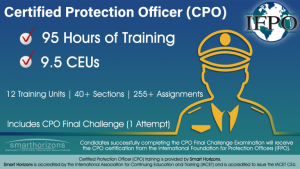Security professional William Evan Gillespie, CPO, SSMP, who was recently the subject of an IFPO testimonial, has written a paper for a graduate course on how the terrorist attacks of Sept. 11 impacted the private security industry. Although the attacks occurred in 2001, the effects it wrought remain to this day and are in place as the United States deals with the coronavirus.
Abstract
The terrorist attacks of September 11th, 2001 had a profound impact on the role that private sector businesses play in protecting national security.
Private security went from being an afterthought and a necessary cost for businesses to undertake to prevent liability to a cornerstone of an organization’s business continuity strategy. Security no longer just revolves around low-paid, poorly trained security guards watching a camera.
The events of 9/11 served as a catalyst for private sector protection to become a colossal industry that encompasses a multitude of disciplines and industries.
Through forming collaborative partnerships with local, state and federal public safety agencies, the private security industry has become a beacon of strength and ingenuity, leading the way in the fight against terrorism. This paper seeks to examine some of the ways in which the private security industry has been impacted by the events of September 11th, 2011.
A Different Kind of Threat
After 9/11, terrorism became a new threat, and not just a new threat, but one that drastically modified the role and scope of the security profession.
Prior to 9/11, private security and public safety agencies operated in two entirely different worlds. Private security focused more on loss prevention and serving the needs of the client or the organization and homeland security was left largely in the hands of the government. The two sectors rarely crossed paths unless it was in each other’s mutual interest.
Security was viewed by most organizations as an afterthought, or a necessary cost that only necessitated the minimum capital expenditures to appease insurance companies and stakeholders. After the events of 9/11, security became viewed as an integral part of an organization’s viability, and security professionals must be closely aligned with business leaders and executives to achieve continued profitability and sustainability.
Security directors in organizations are now consulted by executives and C-suite professionals and provide input and strategies for everything from designing buildings, to conducting business, to hiring employees (Ritchey, 2011). Since 1980, the private protection officer population has doubled to over one million officers, compared to 666,000 sworn police officers (McCarthy, 2017).
Companies recognize the need for highly trained security personnel to control access points, and protect employees, the public and corporate assets. Large security service providers such as Allied Universal provide consultation and assistance in designing emergency action plans for commercial enterprises, and companies are paying more attention to the screening of employees, vendors, and business partners in an effort to prevent terrorism (Security Info Watch, 2008).
Read the rest of the paper (download Word document).
________________________________________________________________________________________________________

Get certified and take your security career to the next level!
The International Foundation for Protection Officers (IFPO) is dedicated to providing meaningful and cost effective security training for security guards and protection officers.
We believe that education is a necessary and essential part of professional security training and the security officer’s background. IFPO serves individuals, security companies, and organizations that have their own private security staff. Our students and members benefit from the recognition and standing that the prestigious IFPO certification conveys.
LIKE and FOLLOW the IFPO on Facebook!
International Foundation for Protection Officers Mission Statement
Mission Statement Part I.
The International Foundation for Protection Officers provides professional learning opportunities for security practitioners, to impart the knowledge, skills, and competencies required to maximize job performance and enhance career potential.
Purpose: to make a positive difference in the quality of the participant’s job performance and elevate the professional status of students who partake of our learning opportunities.
Business: to supply committed security practitioners with a quality education to help achieve their highest potential and provide recognized accreditation for successful completion of educational goals.
Values: commitment, integrity, responsibility, and standards of excellence, provide the platform that supports our journey as we pursue our mission.
Vision Statement
Commitment to Excellence: To be the recognized center of excellence and primary provider of education and training products and services to the security industry.
Mission Statement Part II.
“The International Foundation for Protection Officers is committed to the support and professional development of protection officers and supervisors. Through advocacy, promoting training standards, and providing accessible training, education and certification opportunities, we seek to enhance their professional standing as well as increase and diversify the value of the vital services they provide.”


